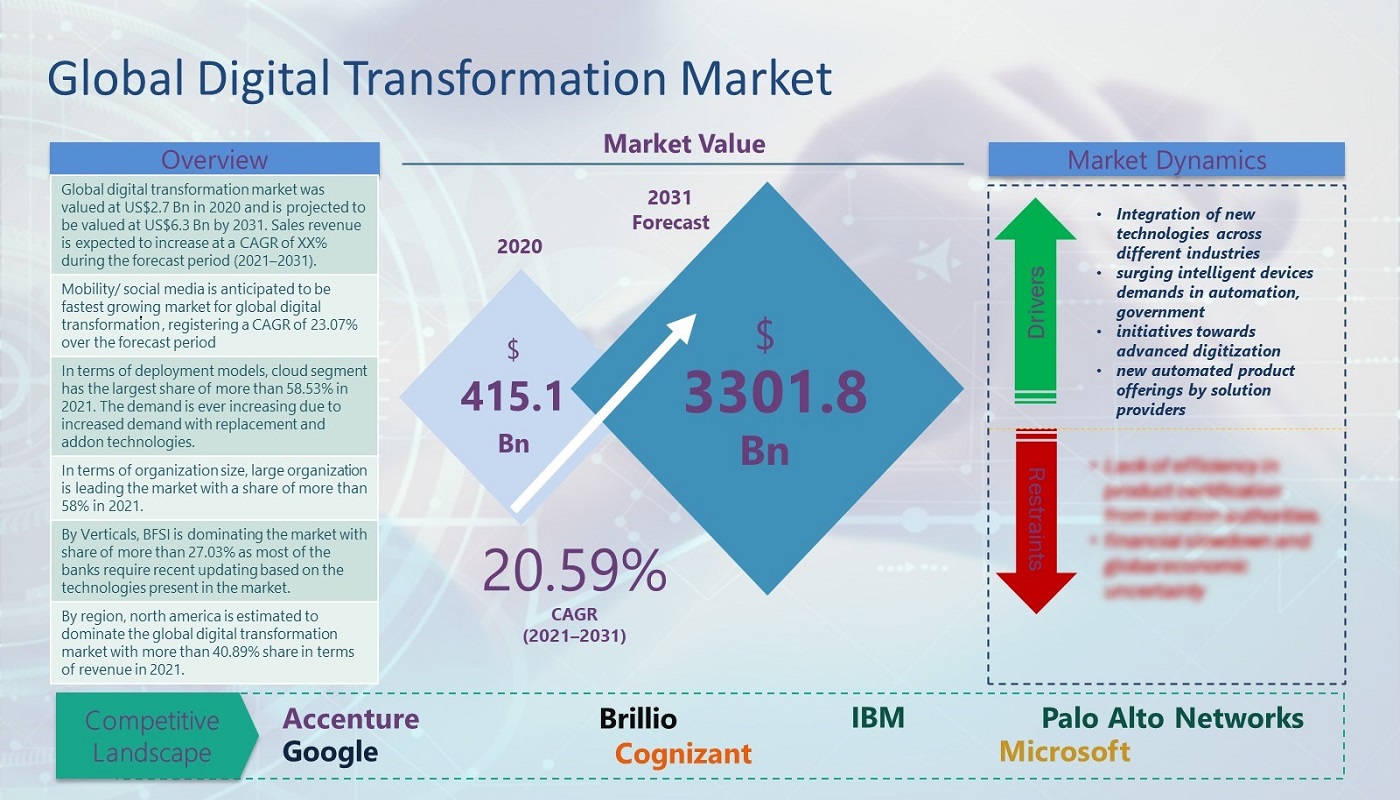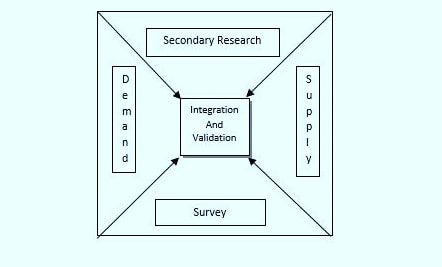Digital Transformation Market (By Deployment Mode -Cloud, On-premises. By components - Hardware, Software, Solutions. By technology - Cloud Computing, IoT, Artificial Intelligence (AI), Big Data and Analytics, Mobility/social media, Cyber security. By organization size - Large Organization, Small and Medium-sized Organization. By industry vertical, BFSI, IT and Telecom, Healthcare, Education, Retail, Manufacturing, Government. By Region - North America, Europe, Asia Pacific, and LAMEA) – Market insights, analysis, trends, and forecast 2021-2031.
Report Type : Syndicate Report
The ‘global digital transformation market’ was valued at $415.1 Billion in 2020 and is expected to reach $3301 Billion at the CAGR of 20.59% between 2021 and 2031. Integration of new technologies across different industries, surging intelligent devices demands in automation, government initiatives towards advanced digitization, and new automated product offerings by solution providers are the primary reasons for the growth of this market during the forecast period.
By Region, North America holds a significant market share of more than 40.89% in 2021

Source: SAI Research
In today’s era, citizens now expect more connected and personalized experiences with government initiatives and plans. This surge in citizen thought process has compelled many governments or organizations such as WHO, UNESCO, IMF and many others worldwide to work over this structure. Also, with the advent of COVID, governments have implemented automated messages daily to reach billions of people about safety and vaccination processes. In addition to this, the government has automated processes for the helpline and provides medical facilities on time to the citizen who needs them.
Download Free PDF Sample Request
Robotic Process Automation shifting trends towards hyperautomation has increased the demand for AI coupled with many other technologies. The AI-based automated system can automatically decide as per the requirement needs set by the user. AI enable intelligence in robots based on which the whole system aligns itself and functions accordingly. Furthermore, artificial intelligence (AI) also enables sound and movement detection, vision recognition, and torque control sensing. Such technological integrations have transformed the traditional systems in factories into smart factories. Therefore, the adoption of AI in robotics is expected to drive its market in the long run. Global transformation initiatives across developed and developing nations have led private, public or government enterprises to deploy mobility and cloud-based applications. The technologies covered in the digital transformation market are cloud computing, AI, big data and analytics, mobility/social media, cybersecurity, IoT, and others (blockchain and robotics).
Many businesses across different industries invest profoundly in mobility, cloud platforms, and big data technologies to develop Digital Experience Platforms (DXP). Moreover, organizations such as consumer packaging goods, automotive and its spare parts, healthcare and BFSI organizations that generate a massive amount of data are adopting digital transformation platforms integrated with new and innovative technologies, such as machine learning, quantum computing, IoT, and blockchain, resulting in generating actionable insights from the data at different levels. These trends are encouraging organizations at different levels to focus on implementing these technologies at a faster level. This implementation in result help companies to manufacture or create new products or improvise products to offer best-in-class at a low price point.
By technology, ‘Cloud Computing’ dominated the global digital transformation market with a share of 34.65% in 2020 and remained dominant through the forecast period. The primary reason supporting the growth of cloud computing is its flexibility and agility during its usage. The other factors that help the market growth are the pay-as-you-go model, on-demand viability, and lower cost of implementation.
In deployment model terms, the cloud segment dominated the global digital transformation market with a share of more than 58% in 2020 and is expected to remain dominant through the forecast period. Cloud-based deployment is cheaper than on-premises deployment and can also be given support remotely in an effortless manner.
By organization size, large organizations majorly implemented these technologies in the past few years and is the primary revenue generator for the digital transformation industry. The major reason for the growth in large organizations is their ability to take risk and failure (if occurred) and good cash flow for advancements in technology. Large organizations dominated the market with a share of more than 58% in 2020 and are expected to remain dominant through the forecast period.
Research Methodology:
Sheer Analytics as an organization has developed a model know as square point approach. This approach has four methods of gathering information.
Secondary Research: Information gathered from trustable resources such as industry associations, company press releases and financial reports, whitepapers and credible news agencies press information.
Demand and Supply approach: Interviews from business experts: Paid interviews were conducted with industry players and leaders
Survey Approach: This approach was done to cater demand of automation in different countries
Integration and Validation: All approaches are integrated, and a concise modeling was done to estimate final numbers accordingly

Major Players in Global digital transformation
According to the study, key players operating in this market are Accenture (Ireland), Adobe (US) Aexonic Technologies (US), Alcor Solutions (US), Brillio (US), Broadcom (US), Cisco (US), Cognizant (US), Dell EMC (US), Emudhra (India), Equinix (US), Genpact (India), Google (US), Happiest Minds (India), HCL Technologies (India), HPE (US), IBM (US), Interfacing (Canada), Kissflow (India), Marlabs (US), Microsoft (US), Oracle (US), Palo Alto Networks (US), Process Maker (US), Process Street (US), SAP (Germany), Scoro (UK), Smartstream (UK), Tibco software (US), and Yash Technologies (US).
Scope of the Report
|
Report Coverage |
Details |
||
|
Base Year: |
2020 |
Market Size in 2020: |
US$ 415.1 Billion |
|
Historical Data for: |
2018 to 2020 |
Forecast Period: |
2021 to 2031 |
|
Forecast Period 2021 to 2031 CAGR: |
20.59% |
2031 Value Projection: |
US$ 3301 Billion |
|
Segments covered: |
By Deployment Mode: Cloud, On-premises. By components: Hardware, Software, Solutions By Technology: Cloud Computing, IoT, Artificial Intelligence (AI), Big Data and Analytics, Mobility/social media, Cyber security By organization size: Large Organization, Small and Medium-sized Organization By industry vertical: BFSI, IT and Telecom, Healthcare, Education, Retail, Manufacturing, Government |
||
|
Geographies covered: |
North America: U.S., Canada, Mexico Europe: Germany, U.K., Spain, France, Italy, Russia, Rest of Europe Asia Pacific: China, India, Japan, Australia, South Korea, ASEAN, and Rest of Asia Pacific Africa: South Africa, North Africa, and Africa Middle East: GCC, Israel, and Rest of Middle East Latin America: Brazil, Argentina, Rest of Latin America |
||
|
Companies covered: |
Accenture (Ireland), Adobe (US) Aexonic Technologies (US), Alcor Solutions (US), Brillio (US), Broadcom (US), Cisco (US), Cognizant (US), Dell EMC (US), Emudhra (India), Equinix (US), Genpact (India), Google (US), Happiest Minds (India), HCL Technologies (India), HPE (US), IBM (US), Interfacing (Canada), Kissflow (India), Marlabs (US), Microsoft (US), Oracle (US), Palo Alto Networks (US), Process Maker (US), Process Street (US), SAP (Germany), Scoro (UK), Smartstream (UK), Tibco software (US), and Yash Technologies (US). |
||
Major reasons of buying this report:
- Covered analysis from business as well as customer end
- All data are UpToDate
- Predictive analytics tools are used for estimating data
- More than 50 interviews were conducted from business end
The Global digital transformation Market Has Been Segmented into:
Global digital transformation market - analysis & forecast, by deployment mode
- Introduction
- Cloud
- On-premises
Global digital transformation market - analysis & forecast, by components
- Hardware
- Software
- Solutions
Global digital transformation market - analysis & forecast, by technology
- Introduction
- Cloud Computing
- IoT
- Artificial Intelligence (AI)
- Big Data and Analytics
- Mobility/social media
- Cybersecurity
- Others (Blockchain and Robotics)
Global digital transformation market - analysis & forecast, by organization size
- Large Organization
- Small and Medium-sized Organization
Global digital transformation market - analysis & forecast, by industry vertical
- BFSI
- IT and Telecom
- Healthcare
- Education
- Retail
- Manufacturing
- Government
- Others
Global digital transformation Market: by region
- North America
- U.S.
- Canada
- Mexico
- Europe
- U.K.
- Russia
- France
- Italy
- Germany
- RoE
- Asia Pacific
- South Korea
- Japan
- China
- India
- Australia
- RoAPAC
- Latin America, Middle East and Africa (LAMEA)
Buy Chapters or Sections
Customization options available to meet your custom research requirements :
- Request a part of this report
- Get geography specific report
- Request historical analysis
- Check out special discounted pricing

